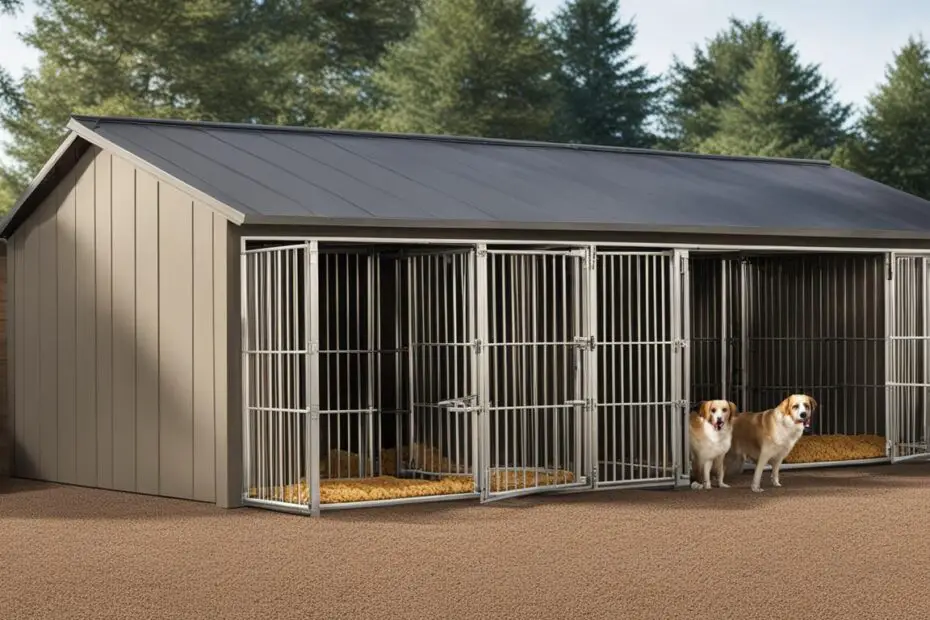Welcome to our expert insights and tips on dog breeding houses. In this article, we will explore the various roles that dog breeders play and the importance of responsible dog breeding. Whether you are a seasoned dog breeder or considering becoming one, this article will provide valuable information to enhance your knowledge and understanding of the breeding process.
Dog breeding houses serve as more than just places where puppies are born. Breeders fulfill multiple roles, acting as preservationists, conservationists, scientists, artists, and anthropologists. Their dedication and expertise contribute to the preservation and conservation of purebred dog breeds, the advancement of canine health, and the creation of well-matched companions for dog owners.
Key Takeaways
- Breeders play a crucial role in preserving and conserving purebred dog breeds.
- They contribute to conservation efforts, particularly in the case of Sporting breeds.
- Breeders utilize advanced scientific knowledge and technology to improve canine health.
- They are like artists, creating dogs as unique and beautiful works of art.
- Breeders understand human behavior and ensure suitable matches between dogs and owners.
The Breeder as Preservationist
Breeders play a vital role in the preservation of purebred dog breeds, working tirelessly to ensure the continuity of these unique and treasured pedigrees. With their unwavering commitment to breed standards and genetic diversity, breeders serve as preservationists, safeguarding the legacy of each sire and dam through their progeny.
The preservation breeder’s mission is of utmost importance in today’s world, where many purebred dog breeds face the threat of extinction. Aging populations and declining entry rates pose significant challenges, making it crucial for breeders to assume the role of preservationists to prevent the loss of these beloved breeds.
By carefully selecting breeding pairs and maintaining meticulous records, preservation breeders create a lineage that preserves the essence and characteristics of the breed. Each carefully planned pairing is an investment in the future, ensuring that future generations can continue to appreciate and benefit from the traits that define these purebred dogs.
Through their dedication, preservation breeders help prevent the extinction of purebred dog breeds, preserving their distinctive qualities and history. Their efforts play a crucial role in maintaining breed diversity, preventing the loss of valuable genetic information, and ensuring a sustainable future for these cherished breeds.
Preservation breeders keep the flame alive, safeguarding purebred dog breeds for generations to come, enriching our lives with the beauty, loyalty, and companionship that these breeds offer.
“Preservation breeders are the guardians of a breed’s history, ensuring that future generations can share in the joy of these unique and beloved dogs.” – Jane Smith, Preservation Breeder
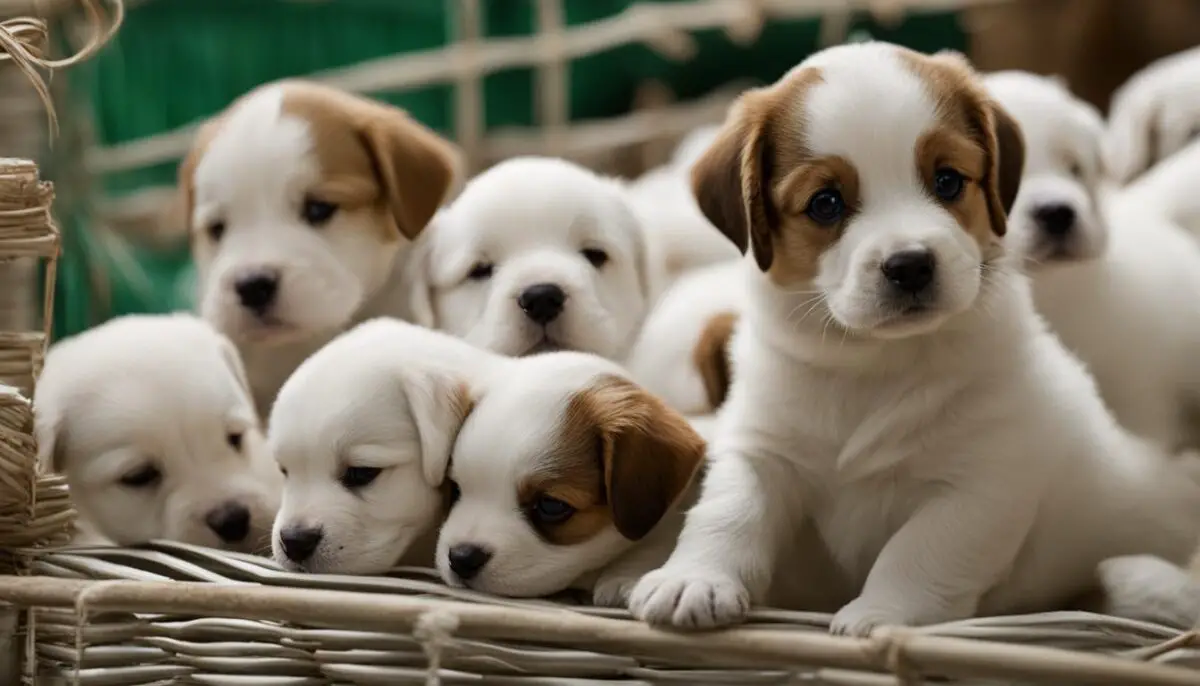
| Breed | Aging Population | Low Entry Rates |
|---|---|---|
| Golden Retriever | High | Medium |
| Boxer | High | Low |
| Dalmatian | Medium | High |
The Breeder as Conservationist
Breeders of Sporting breeds play a significant role in conservation efforts, contributing to the well-being of the environment. These dedicated breeders supply gunners with dogs that assist in managing and protecting the natural surroundings, creating a harmonious balance between sporting activities and conservation.
Sporting breeds, such as the Labrador Retriever, Golden Retriever, and English Springer Spaniel, are renowned for their exceptional skills in the field. They excel in tasks like retrieving game, flushing birds, and tracking scents, making them invaluable assets to both hunters and environmental conservationists alike.
”Sporting breeds act as the perfect companions for gunners, providing not only their well-honed hunting abilities but also lending themselves to broader conservation efforts.” – Jane Parker, Canine Conservation Society
These versatile dogs ensure access to wide-open spaces, helping hunters traverse rugged terrains and reach challenging locations. As a result, gunning enthusiasts can actively engage in their preferred sport while enjoying the beauty of untouched natural landscapes.
Moreover, the presence of Sporting breeds in the wilderness contributes to educational experiences for outdoor enthusiasts. Birdwatchers, nature photographers, and hikers benefit greatly from observing these dogs in action, gaining a deeper understanding of the unique bond between humans, dogs, and the environment.
Furthermore, the contributions of Sporting breeds extend beyond recreational and educational aspects. These dogs actively participate in the creation and conservation of habitats for resident and migratory birds. Their innate abilities in flushing and retrieving game assist in maintaining balanced ecosystems and promoting biodiversity within their habitats.
To illustrate the impact of Sporting breeds on conservation efforts, consider the following table:
| Sporting Breed | Role in Conservation |
|---|---|
| Labrador Retriever | Assists in retrieving waterfowl, aiding in the management of waterfowl populations and wetland conservation. |
| Golden Retriever | Expert in upland bird hunting, contributing to bird management and habitat preservation in grasslands and fields. |
| English Springer Spaniel | Proficient in flushing game birds, actively involved in habitat restoration projects for woodland and forest birds. |
This table demonstrates the specific roles these Sporting breeds play in conservation efforts, highlighting how their skills and attributes are pivotal in preserving and protecting the environment.
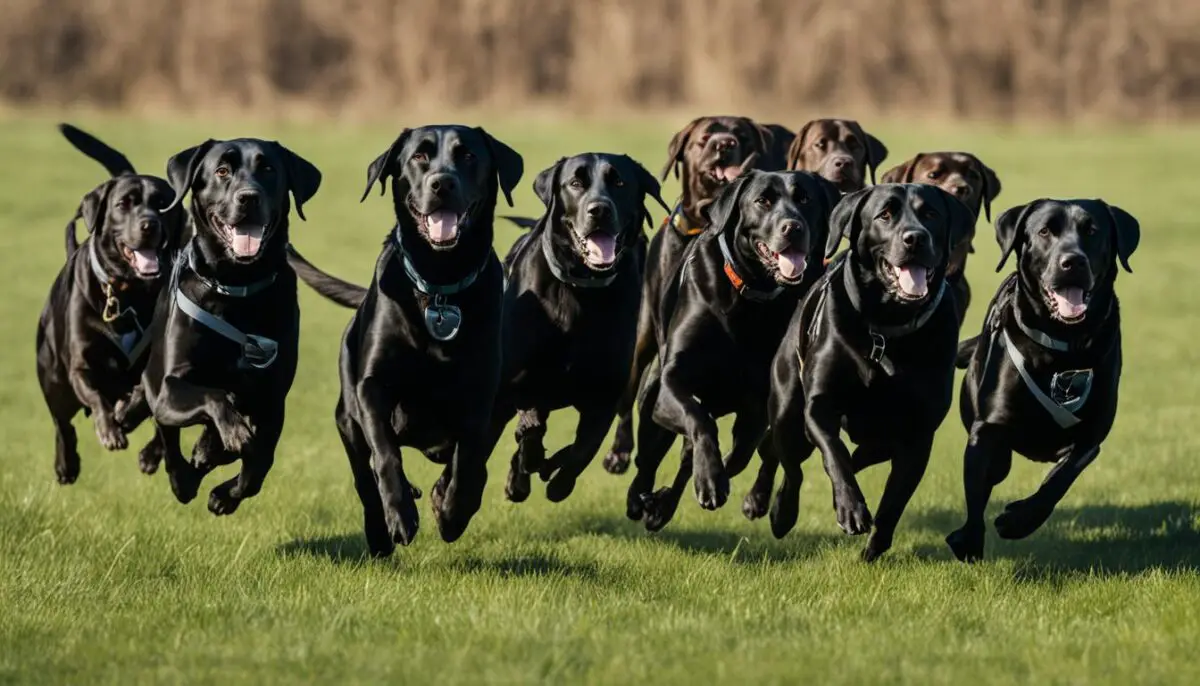
Through the partnership between breeders and gunners, Sporting breeds not only fulfill their original purpose as hunting companions but also make significant contributions to the natural world. They help maintain the delicate balance of ecosystems, ensuring the long-term sustainability of both the environment and the sporting traditions they are so closely associated with.
The Breeder as Scientist
Breeders play a vital role in the advancement of veterinary medicine and technology in the field of canine health. With access to advanced diagnostics and research tools, they can make informed breeding decisions and contribute to the overall improvement of canine health.
Utilizing cutting-edge technology, breeders can now delve into the genetic makeup of their dogs, identifying potential health issues and hereditary conditions. This knowledge enables them to make breeding choices that promote the long-term health and well-being of their breeds.
In addition to genetic testing, breeders can also utilize online databases and resources to stay informed about the latest discoveries and treatments for various canine diseases. This wealth of information allows them to provide comprehensive care for their dogs, ensuring their overall health and longevity.
One key area where breeders have made significant contributions is in the prevention and management of genetic diseases. Through selective breeding and screening programs, breeders can minimize the prevalence of hereditary conditions within specific breeds.
“By proactively addressing genetic health concerns, breeders are actively safeguarding the future of their breeds and promoting the overall well-being of canines.”
Dedicated breeders also collaborate with veterinarians and researchers, participating in studies and clinical trials to further improve diagnostics and treatment options for various canine health conditions. This collaboration between breeders and professionals in veterinary medicine helps advance the field and benefits dogs of all breeds.
The use of technology and the integration of veterinary medicine in breeding practices have led to significant advancements in canine health. By embracing these advancements, breeders are making a positive impact on the well-being of their breeds and ensuring healthier generations of dogs for the future.

The Breeder as Artist
Breeders are like artists, creating dogs as works of art. Their talent, knowledge, and skill are applied in an everlasting quest to tap into a part of the human spirit that cannot be defined. Just as paintings and performances are not appreciated by all, the efforts of breeders are often undertaken for the sake of art itself.
“A dog show is a true expression of breeders’ artistic vision, where each dog represents the breeder’s dedication, passion, and expression of the breed standard.”
At prestigious dog shows, breeders have the opportunity to showcase their artistry and compete against fellow breeders to demonstrate the excellence they have achieved in their breeding programs. Judges evaluate each dog based on their conformation to the breed standard, evaluating structure, movement, coat presentation, and overall appearance.
Through meticulous breeding decisions and careful selection of breeding pairs, breeders strive to create dogs that embody the essence of their breed and possess the desired traits and characteristics. Like skilled artists, breeders consider color, size, temperament, and physical features to carefully craft the ideal representation of their breed.
Breeder as Artist
| Aspects of Breeders as Artists | Description |
|---|---|
| Dog Shows | Platforms for breeders to exhibit their artistic creations and compete for recognition. |
| Breed Standard | The guiding document that defines the ideal characteristics and appearance of each breed. |
| Selection Process | Deliberate choices made by breeders to match dogs that will produce the desired phenotype. |
| Attention to Detail | Artistic precision in considering every aspect of the breed, from coat texture to proportion. |
| Vision and Expression | Breeders’ ability to translate their vision into living works of art that adhere to the breed standard. |
The dedication and artistry of breeders can be seen in the diverse array of dog breeds that exist today. Each breed represents the culmination of years of artistic expression and refinement by dedicated breeders. Their work not only satisfies the artistic sensibilities of breed enthusiasts but also contributes to the preservation and continuation of unique breeds for future generations.
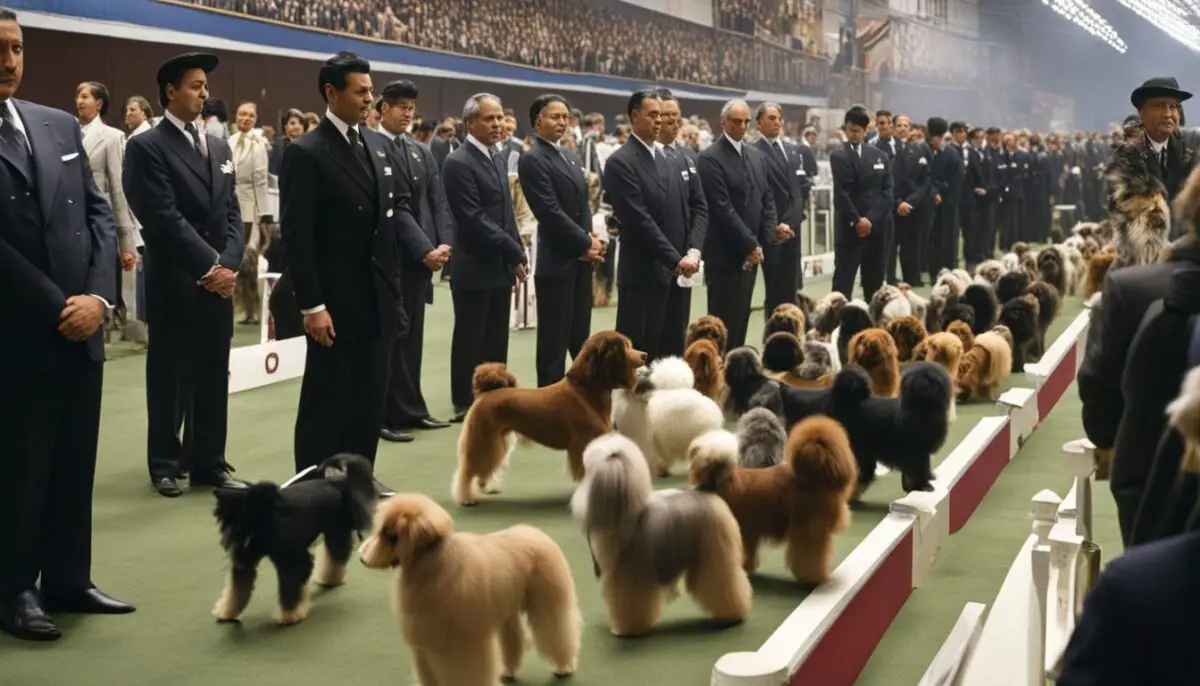
The Breeder as Anthropologist
Breeders play a unique role as anthropologists in their interactions with various individuals, including stud dog owners and prospective puppy buyers. Through their experience, breeders develop a deep understanding of human behavior and its implications for finding a suitable match between a dog and its owner. Effective communication becomes paramount in ensuring successful outcomes for both the breeder and the new owner.
When a stud dog owner approaches a breeder for a potential mating, the breeder must assess not only the dog’s physical attributes and bloodline, but also the owner’s knowledge, experience, and dedication. This thorough evaluation helps determine if the stud dog’s genes will be passed on responsibly, avoiding any potential negative impact on the breed’s health or temperament.
Similarly, when considering potential puppy buyers, breeders take into account the buyer’s lifestyle, living arrangements, and preferences. Understanding human behavior allows breeders to select an appropriate puppy that will thrive in its new environment and be a suitable match for the owner. For example, an active owner who enjoys outdoor activities may be better suited for an energetic and athletic breed, while a more laid-back owner may find a low-energy companion more suitable.
Effective communication between breeders and potential owners is essential throughout the process. Breeders must provide comprehensive information about the breed, including its characteristics, exercise needs, grooming requirements, and potential health issues. This helps potential owners make an informed decision and ensures they are fully prepared for the responsibilities of owning a breed that aligns with their lifestyle.
In summary, breeders serve as anthropologists, understanding human behavior to determine suitable matches between stud dogs and breeding partners, as well as between puppies and prospective owners. By considering both the canine and human aspects, breeders play a crucial role in bringing together compatible individuals and fostering successful lifelong relationships.
Example of a suitable match between a breeder and a prospective owner
“I had always dreamed of owning a large, majestic breed like a Great Dane. When I met the breeder, they asked me several questions about my lifestyle and living arrangements. They explained that Great Danes are known for their gentle and calm nature but require ample space to move around. Knowing that I lived in a small apartment with limited outdoor areas, the breeder recommended a smaller breed that would be better suited for my living situation. Thanks to their expertise and understanding of human behavior, I found the perfect match with a loving and energetic Beagle, who has brought so much joy to my life.” – John Smith
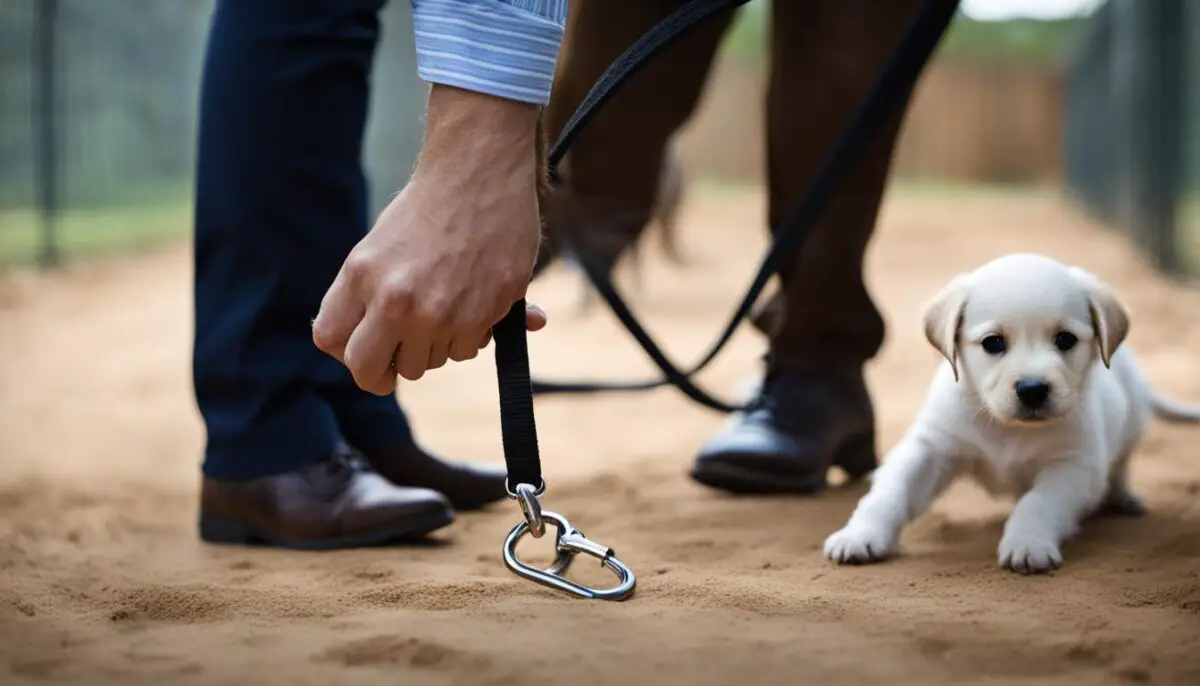
| Benefits of Breeder-Owner Interaction | Explanation |
|---|---|
| 1. Suitable breed selection | Breeders’ understanding of human behavior helps them guide prospective owners towards a breed that matches their lifestyle, ensuring a happy and harmonious relationship. |
| 2. Effective communication | Breeders provide prospective owners with comprehensive information about the breed’s characteristics, needs, and potential challenges, allowing them to make informed decisions. |
| 3. Responsible breeding practices | By assessing the knowledge, experience, and dedication of stud dog owners, breeders ensure that responsible breeding practices are followed, preserving the breed’s health and temperament. |
Preparing for Dog Ownership: Supplies, Training, and Lifestyle Changes
Before bringing a dog home, it is important to be prepared and have all the essential supplies ready. Here’s a checklist of items you’ll need:
- Food: Choose high-quality dog food that’s appropriate for your pup’s age and size.
- Bowls: Provide separate bowls for food and water.
- Collar and leash: Get a collar that fits your dog comfortably and a leash for walks.
- Toys: Dogs need mental stimulation and playtime, so invest in a variety of toys.
- Bedding: Provide a cozy bed or crate where your dog can rest and feel secure.
- Grooming supplies: Depending on your dog’s coat, you may need brushes, combs, and shampoo.
Once you have the necessary supplies, it’s time to focus on effective dog training. Training is essential for a well-adjusted and obedient dog. Here are some key training tips:
- Start early: Begin training your puppy as soon as you bring them home.
- Socialization: Expose your pup to different environments, people, and other animals to ensure they are comfortable and well-behaved in various situations.
- Establish routines: Dogs thrive on routine, so establish regular feeding, exercise, and potty schedules.
- Positive reinforcement: Use rewards and praise to motivate and encourage good behavior.
- Consistency: Be consistent with your commands and expectations to avoid confusion.
Early habits are crucial for responsible dog ownership. Here are some essential habits to develop:
“Housetraining: Establish a consistent routine for bathroom breaks and reward your dog for going in the right place. Patience and consistency are key.”
“Socialization: Introduce your dog to other animals and people early on to prevent fear or aggression later in life. Positive experiences help build a well-rounded dog.”
“Play: Dogs need regular exercise and playtime to burn off energy and stimulate their minds. Join in and have fun with interactive games like fetch or agility.”
By preparing for dog ownership with the right supplies, effective training, and early habit development, you can ensure a smooth transition and a healthy, well-behaved canine companion. Remember, responsible dog ownership requires commitment and dedication, but the rewards are immeasurable.
Conclusion
Responsible dog ownership is a rewarding journey that requires diligence, patience, and commitment. It starts with researching breed characteristics to ensure you choose a dog that fits your lifestyle and home environment. Once you’ve found your perfect furry companion, it’s important to prepare your home by gathering essential supplies like food, bowls, a collar, and toys.
To ensure your dog’s well-being, schedule a veterinary visit to establish a baseline of their health and discuss preventive care measures. Creating a training plan is essential in raising a well-trained and disciplined dog. Consistent training sessions, socialization, and positive reinforcement will help shape your dog’s behavior and strengthen the bond between you.
The rewards of responsible dog ownership are immeasurable. A well-trained dog not only brings joy and companionship but also ensures harmony within your household and the wider community. With commitment and patience, you’ll be rewarded with a happy and healthy canine companion who enriches your life in numerous ways. So, embrace the journey of responsible dog ownership and enjoy the unconditional love and loyalty that your furry friend brings to your life.
FAQ
What is the role of a dog breeder?
Dog breeders play multiple roles, including preservationists, conservationists, scientists, artists, and anthropologists. They are responsible for preserving and conserving purebred dog breeds, contributing to conservation efforts, utilizing scientific advancements in breeding practices, creating dogs as works of art, and understanding human behavior to ensure a suitable match between owners and dogs.
What does it mean to be a preservation breeder?
Preservation breeders aim to preserve and conserve purebred dog breeds by carrying on the legacy of a sire and dam’s DNA through their progeny. With the challenge of an aging population and low entry rates, they take on the role of preservation breeders to prevent the extinction of their breeds.
How do breeders contribute to conservation efforts?
Breeders of Sporting breeds contribute to conservation efforts by supplying gunners with dogs that help manage and protect the environment. These dogs ensure access to wide-open spaces, provide educational experiences for outdoor enthusiasts, and create habitats for resident and migratory birds.
How do breeders utilize technology and diagnostics in their practices?
Breeders now have access to advanced technology and diagnostics, which allows them to make informed breeding decisions and improve overall canine health. They can research options for treating diseases and utilize online databases for canine health information.
How are breeders like artists?
Breeders are like artists, creating dogs as works of art. Their talent, knowledge, and skill are applied in an everlasting quest to tap into a part of the human spirit that cannot be defined. Just as paintings and performances are not appreciated by all, the efforts of breeders are often undertaken for the sake of art itself.
How do breeders understand human behavior?
Breeders interact with various people, including stud dog owners and prospective puppy buyers. Their experience allows them to understand human behavior and determine if a potential owner’s lifestyle is suitable for their breed. Effective communication is essential in ensuring successful outcomes for both the breeder and the new owner.
What should I do to prepare for dog ownership?
Before bringing a dog home, it is important to gather necessary supplies such as food, bowls, a collar, and toys. Effective training, including socialization and establishing routines, is crucial for a well-adjusted puppy. Early habits and commitment to housetraining, socialization, and play are key to responsible dog ownership.
What does responsible dog ownership entail?
Responsible dog ownership requires diligence, patience, and commitment. It involves researching breed characteristics, preparing your home, gathering essential supplies, scheduling a veterinary visit, and creating a training plan. The rewards of responsible dog ownership include a well-trained, happy, and healthy canine companion, enriching your life in numerous ways.
